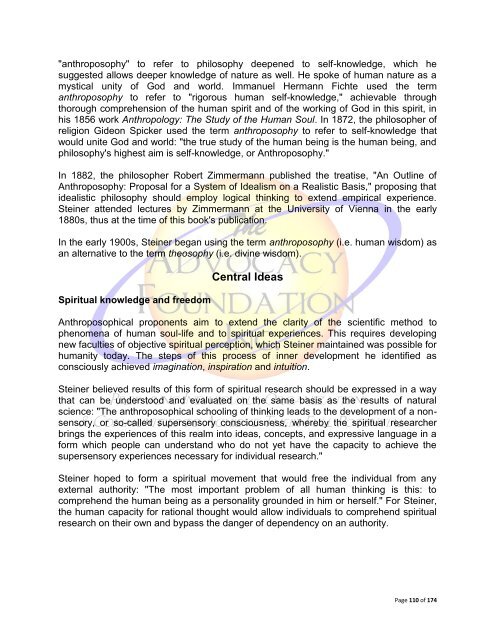The Gift of Spirituality
The Gift of Spirituality
The Gift of Spirituality
Create successful ePaper yourself
Turn your PDF publications into a flip-book with our unique Google optimized e-Paper software.
"anthroposophy" to refer to philosophy deepened to self-knowledge, which he<br />
suggested allows deeper knowledge <strong>of</strong> nature as well. He spoke <strong>of</strong> human nature as a<br />
mystical unity <strong>of</strong> God and world. Immanuel Hermann Fichte used the term<br />
anthroposophy to refer to "rigorous human self-knowledge," achievable through<br />
thorough comprehension <strong>of</strong> the human spirit and <strong>of</strong> the working <strong>of</strong> God in this spirit, in<br />
his 1856 work Anthropology: <strong>The</strong> Study <strong>of</strong> the Human Soul. In 1872, the philosopher <strong>of</strong><br />
religion Gideon Spicker used the term anthroposophy to refer to self-knowledge that<br />
would unite God and world: "the true study <strong>of</strong> the human being is the human being, and<br />
philosophy's highest aim is self-knowledge, or Anthroposophy."<br />
In 1882, the philosopher Robert Zimmermann published the treatise, "An Outline <strong>of</strong><br />
Anthroposophy: Proposal for a System <strong>of</strong> Idealism on a Realistic Basis," proposing that<br />
idealistic philosophy should employ logical thinking to extend empirical experience.<br />
Steiner attended lectures by Zimmermann at the University <strong>of</strong> Vienna in the early<br />
1880s, thus at the time <strong>of</strong> this book's publication.<br />
In the early 1900s, Steiner began using the term anthroposophy (i.e. human wisdom) as<br />
an alternative to the term theosophy (i.e. divine wisdom).<br />
Spiritual knowledge and freedom<br />
Central Ideas<br />
Anthroposophical proponents aim to extend the clarity <strong>of</strong> the scientific method to<br />
phenomena <strong>of</strong> human soul-life and to spiritual experiences. This requires developing<br />
new faculties <strong>of</strong> objective spiritual perception, which Steiner maintained was possible for<br />
humanity today. <strong>The</strong> steps <strong>of</strong> this process <strong>of</strong> inner development he identified as<br />
consciously achieved imagination, inspiration and intuition.<br />
Steiner believed results <strong>of</strong> this form <strong>of</strong> spiritual research should be expressed in a way<br />
that can be understood and evaluated on the same basis as the results <strong>of</strong> natural<br />
science: "<strong>The</strong> anthroposophical schooling <strong>of</strong> thinking leads to the development <strong>of</strong> a nonsensory,<br />
or so-called supersensory consciousness, whereby the spiritual researcher<br />
brings the experiences <strong>of</strong> this realm into ideas, concepts, and expressive language in a<br />
form which people can understand who do not yet have the capacity to achieve the<br />
supersensory experiences necessary for individual research."<br />
Steiner hoped to form a spiritual movement that would free the individual from any<br />
external authority: "<strong>The</strong> most important problem <strong>of</strong> all human thinking is this: to<br />
comprehend the human being as a personality grounded in him or herself." For Steiner,<br />
the human capacity for rational thought would allow individuals to comprehend spiritual<br />
research on their own and bypass the danger <strong>of</strong> dependency on an authority.<br />
Page 110 <strong>of</strong> 174

















